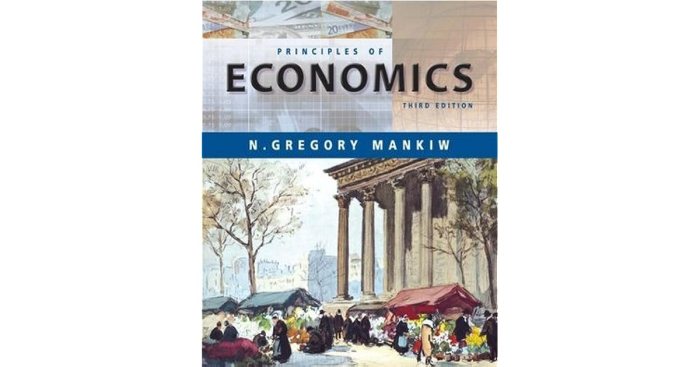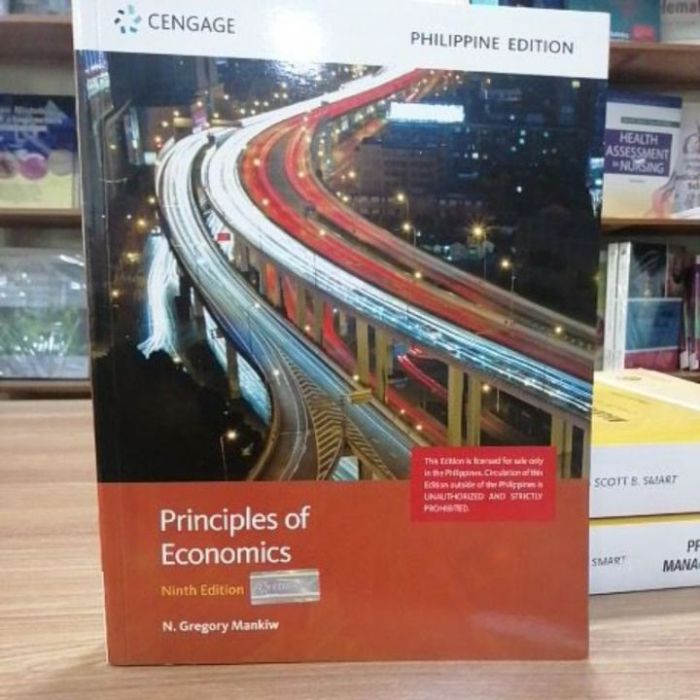Principles of economics mankiw 9th edition – Introducing the esteemed Principles of Economics: Mankiw 9th Edition, a comprehensive guide to the fundamental concepts and principles that govern economic decision-making, market behavior, and global economic dynamics. This meticulously crafted text delves into the intricate workings of microeconomics, macroeconomics, international economics, government intervention, and economic growth, equipping readers with a profound understanding of the economic forces that shape our world.
With its lucid explanations, engaging examples, and up-to-date analysis, Principles of Economics: Mankiw 9th Edition empowers readers to critically examine economic issues, evaluate policy options, and make informed decisions in both personal and professional contexts.
Microeconomic Principles
Microeconomics examines the behavior of individual entities within the economy, such as consumers, firms, and households. It focuses on supply and demand interactions in specific markets and the allocation of resources among different goods and services.
Scarcity and Economic Decision-Making
Scarcity refers to the limited availability of resources relative to the unlimited wants of individuals. This forces economic agents to make choices and prioritize their needs, as they cannot have everything they desire. Scarcity drives the fundamental economic problem of allocation: how to efficiently distribute scarce resources to satisfy human wants.
Supply and Demand
Supply and demand are the forces that determine market prices. Supply refers to the quantity of a good or service that producers are willing and able to offer for sale at a given price. Demand refers to the quantity of a good or service that consumers are willing and able to buy at a given price.
The interaction of supply and demand establishes the equilibrium price and quantity in the market.
Elasticity
Elasticity measures the responsiveness of quantity demanded or supplied to changes in price. Price elasticity of demand measures the percentage change in quantity demanded in response to a 1% change in price. Price elasticity of supply measures the percentage change in quantity supplied in response to a 1% change in price.
Elasticity is crucial in understanding market dynamics and predicting consumer and producer behavior.
Macroeconomic Principles: Principles Of Economics Mankiw 9th Edition

Macroeconomics studies the economy as a whole, focusing on broad aggregates such as total output, employment, inflation, and economic growth. It examines the interactions between different sectors of the economy and the impact of government policies on economic performance.
Circular Flow of Income and Expenditure
The circular flow of income and expenditure depicts the flow of goods, services, and money through the economy. Households supply labor and other resources to firms, which use them to produce goods and services. Firms sell these goods and services to households, generating income for households.
Households then use this income to purchase goods and services from firms, completing the circular flow.
Monetary and Fiscal Policy
Monetary policy, conducted by the central bank, involves managing the money supply and interest rates to influence economic activity. Fiscal policy, implemented by the government, involves changing government spending and taxation to affect aggregate demand and economic growth.
Inflation and Unemployment, Principles of economics mankiw 9th edition
Inflation refers to a sustained increase in the general price level, while unemployment refers to the number of people who are actively seeking work but cannot find it. Both inflation and unemployment are major macroeconomic concerns that policymakers try to manage.
International Economics

International economics focuses on the economic interactions between countries. It examines the flow of goods, services, and capital across borders and the impact of international trade and investment on economic growth and development.
Comparative Advantage and Specialization
Comparative advantage refers to the ability of countries to produce goods and services at a lower opportunity cost than others. Specialization occurs when countries focus on producing goods and services in which they have a comparative advantage and trade with other countries to obtain goods and services in which they do not have a comparative advantage.
Exchange Rates
Exchange rates are the prices of one currency in terms of another. They play a crucial role in facilitating international trade and investment by determining the relative costs of goods and services across countries.
Impact of International Trade
International trade can promote economic growth and development by increasing competition, fostering innovation, and expanding market opportunities. However, it can also lead to job losses and income inequality in certain sectors.
Government and the Economy

Government plays a significant role in the economy through its provision of public goods and services, taxation and spending policies, and regulation of economic activity.
Public Goods and Services
Public goods are goods and services that cannot be efficiently provided by the private sector because they are non-excludable (everyone can benefit from them) and non-rivalrous (one person’s consumption does not reduce another’s consumption). Examples include national defense, public parks, and infrastructure.
Taxation and Spending
Government collects taxes to finance its expenditures on public goods and services. Taxation can affect economic incentives and resource allocation, while government spending can stimulate economic activity.
Government Policies
Government implements various policies to achieve economic goals such as promoting economic growth, reducing unemployment, and controlling inflation. These policies can include fiscal and monetary policies, as well as regulations and subsidies.
Economic Growth and Development

Economic growth refers to the sustained increase in the production of goods and services over time, while economic development refers to the improvement in living standards and quality of life.
Factors Contributing to Economic Growth
Key factors that contribute to economic growth include capital accumulation, technological innovation, human capital development, and institutional factors such as property rights and rule of law.
Role of Innovation and Technological Change
Innovation and technological change are powerful drivers of economic growth. They lead to new products, processes, and industries, which can increase productivity and improve living standards.
Challenges and Opportunities for Developing Countries
Developing countries face unique challenges and opportunities in their pursuit of economic growth and development. These include issues such as poverty, inequality, lack of infrastructure, and political instability.
Question & Answer Hub
What is the central theme of Principles of Economics: Mankiw 9th Edition?
The central theme revolves around the fundamental principles that govern economic decision-making, market behavior, and global economic dynamics, providing a comprehensive understanding of how economies function.
How does Principles of Economics: Mankiw 9th Edition approach the study of economics?
The text takes a rigorous yet accessible approach, presenting economic concepts and principles in a clear and engaging manner, making it suitable for both students and general readers.
What are the key strengths of Principles of Economics: Mankiw 9th Edition?
Its strengths lie in its comprehensive coverage, lucid explanations, engaging examples, and up-to-date analysis, empowering readers to critically examine economic issues and make informed decisions.